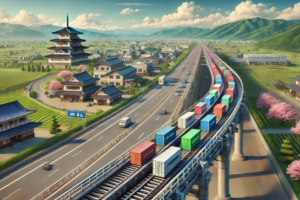ButSpeak.com
News which Matters.

Japan’s innovative plan to connect major cities with automated zero-emissions logistics links, aiming to revolutionize cargo transport and reduce greenhouse gas emissions.
In a groundbreaking move to revolutionize its logistics network, the Japanese government is planning to connect major cities with automated, zero-emissions links. This ambitious initiative aims to efficiently shift millions of tons of cargo while removing tens of thousands of trucks from the road, significantly reducing greenhouse gas emissions.
According to The Japan News, the Land, Infrastructure, Transport, and Tourism Ministry has been discussing this project since February. An expert panel at the ministry released a draft outline of an interim report on Friday, detailing plans to complete the first link between Tokyo and Osaka by 2034.
Japan’s population decline has long been a concern, leading to severe labor shortages across various sectors. The logistics industry is particularly vulnerable, especially with the rise of online shopping. By 2030, it is expected that around 30% of parcels may not reach their destinations due to a lack of delivery drivers. This project aims to mitigate these challenges by automating the transportation of goods.
The proposed logistics link is expected to handle as much small cargo between Tokyo and Osaka as 25,000 trucks. The system would involve individual pallets carrying up to a ton of small cargo items, moving autonomously from one end to the other without human interference.
Several potential solutions are being considered to realize this project. One idea is to use massive conveyor belts to cover the 500-km (310-mile) distance between Tokyo and Osaka, potentially running alongside highways or through tunnels beneath the roads. Another option involves flat lanes or tunnels where automated electric carts could transport the pallets.
Building a 500-km tunnel is a daunting and costly endeavor, estimated at around $23 billion, not including the cost of conveyor belts or autonomous carts. Given the rapid advancements in driverless technology, another viable alternative might be autonomous electric trucks. By 2034, it’s plausible that self-driving vehicles could be widely deployed, potentially simplifying the project and reducing infrastructure costs.
The Japanese government is seeking private sector funding to support this project, underscoring its commitment to tackling logistics and environmental challenges. Land, Infrastructure, Transport and Tourism Minister Tetsuo Saito emphasized the dual benefits of the initiative: addressing logistical issues and reducing greenhouse gas emissions.
Japan’s ambitious plan to establish automated, zero-emissions logistics links between major cities represents a significant step forward in addressing the country’s labor shortages and environmental concerns. By leveraging innovative technologies and engaging the private sector, Japan aims to create a more efficient and sustainable logistics network, setting a new standard for the future of cargo transportation.